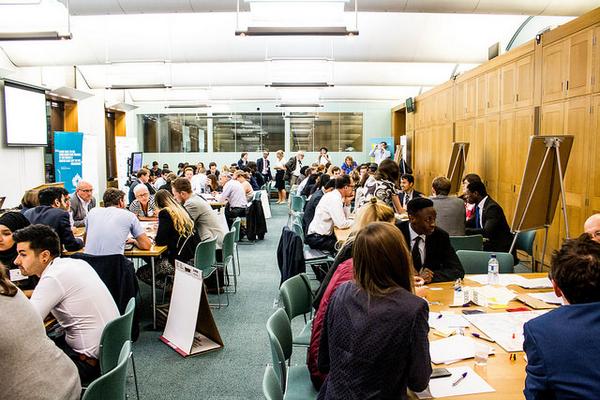The debate on the future of the British constitution must involve civil society
The referendum on Scottish independence has produced a burst of interest in constitutional issues, particularly following the Prime Minister’s espousal of ‘English Votes for English Legislation’. John Tizard argues that what follows mustn’t be an elite-led conversation, which avoids offering local government as the only solution, while including a large role for civil society.
New powers, authority and resources have to be devolved to the Scottish Parliament as a consequence of the ‘vow’ made last week by the three major Westminster party leaders. Anything less would be a betrayal of the Scottish people, and extremely damaging to democracy and the reputation of the politicians.
Assuming that the three leaders and their parliamentary parties honour this pledge and maybe even negotiate and agree with the Scottish Government to enhance it further, the debate has then to move on to the future of government and political accountability across the UK and in particular in England.
There are many options which could be considered and hopefully will be. In this article, I am not going to address the natural desire to consider some form of federal system for the UK. Nor I am not going to identify these or to consider the options for England other than to recognise that critically there seems to be a consensual view that there will have to be more decentralisation and devolution. This would be case whether or not there is an English parliament.
Naturally local government sees a great opportunity both for individual authorities and for collective groups – for example city and economic sub-regional local authority consortia.
I believe that local government would be well advised to avoid appearing to believe that the only solutions lie with local government. This should not be about simply adding more powers and responsibilities to existing local authorities. There is an opportunity to be more radical and more strategically comprehensive. I say this as one who has for many years wanted more devolution to local government; a true realisation of the Total Place model; and powerful local government leadership in economic, welfare, employment, transport, health, police, education, housing and much more. Indeed I assume that this will be a starting point for any serious consideration of English devolution but not the end.
This should not be about simply adding more powers and responsibilities to existing local authorities but an opportunity to be more radical
It is also going to vital that there is a debate and processes which involve and empower the public. England can learn much from Scotland and its incredible referendum campaign.
This English debate and these processes must also involve civil society and in particular the voluntary and community sector. There is an opportunity to create a new more inclusive approach to politics and the constitution. Perhaps it is better to describe the approach as one of evolution rather than creation.
I would strongly argue that, whatever the design of new political and constitutional arrangements, there will be an increasing need for an effective civil society that fills the space between the state, the market and communities and individuals. This is a a public space that is not dominated by markets or the state but is filled, supported and energised by a range of communities, voluntary groups, community associations, charities, faith groups, trade unions and friendly societies working – often together – for the common good.
Fostering civil society and its open space does not diminish the role and importance of democratic government. Actually, it can enhance it and complement it wonderfully.
Local community social action and participatory democracy have roles to play alongside, in support of, and at times challenging to democratic elected representatives and political institutions. Therefore, the national debate and any constitutional convention should involve the voluntary and community sector and other civil society organisations; and more importantly they have to consider the significant contribution the voluntary and community sector can make to society and its powerful voice for communities.
A new constitutional settlement will be very important but on its own will be insufficient. There has to be a recognition that politics and political practices have to change too given how much people feel alienated and disempowered. Such a settlement and relevant political practices have to be value-based and driven by the kind of society and economy we wish to live in. For me that means a fairer, more equal, cohesive and inclusive, and socially just society underpinned by a fairer more socially responsible economy; and a political system based on equal access and inclusiveness, high levels of engagement, transparency, accountability and social purpose.
Much of the voluntary and community sector and wider civil society are based on these values and share these objectives. Much of the sector exhibits the behaviours necessary to secure this form of political practice.
Consequently for so many positive reasons civil society and in particular the voluntary and community sector have to be in the vanguard of the debate on the future of the country, its constitution, its politics and its values.
—
Note: this piece originally appeared in New Start magazine and is reposted with permission. It represents the views of the author and not those of Democratic Audit or the LSE. Please read our comments policy before posting.
—
 John Tizard is an independent strategic advisor and commentator on public policy and services. He is a former council leader and was director of the Centre for Public Service Partnerships.
John Tizard is an independent strategic advisor and commentator on public policy and services. He is a former council leader and was director of the Centre for Public Service Partnerships.






 Democratic Audit's core funding is provided by the Joseph Rowntree Charitable Trust. Additional funding is provided by the London School of Economics.
Democratic Audit's core funding is provided by the Joseph Rowntree Charitable Trust. Additional funding is provided by the London School of Economics.
The debate on the future of the British constitution must involve civil society says John Tizard https://t.co/iAWljpfDeY
The debate on future of theBritish constitution must involve civil society https://t.co/d8UMA2Z35a @Mjoneh6 Thought this might interest you
The debate on the future of the British constitution must involve civil society https://t.co/XS88EICrfC
The debate on the future of the British constitution must involve civil society https://t.co/1OGYjyiX8a